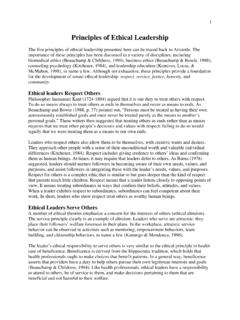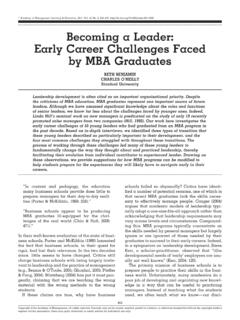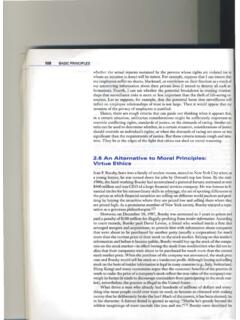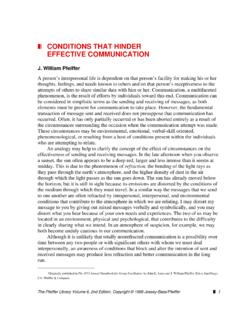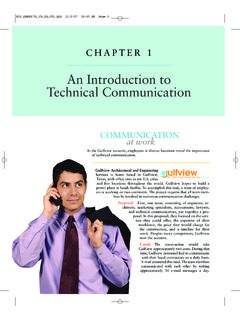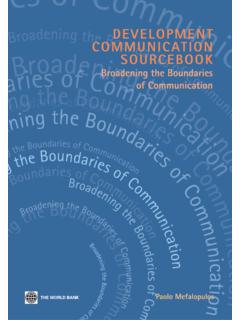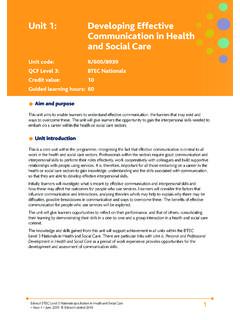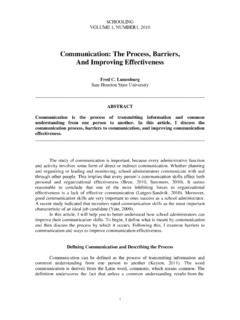Transcription of Executive Perceptions of the Top 10 Soft Skills Needed in ...
1 460400 ss communication QuarterlyInterpersonal communication in the Workplace Business communication Quarterly Executive Perceptions of 75(4) 453 465. 2012 by the Association for Business communication the Top 10 Soft Skills Needed Reprints and permission: http://www. in Today's Workplace DOI: Marcel M. Robles1. Abstract Hard Skills are the technical expertise and knowledge Needed for a job. Soft Skills are interpersonal qualities, also known as people Skills , and personal attributes that one possesses. Business executives consider soft Skills a very important attribute in job applicants. Employers want new employees to have strong soft Skills , as well as hard Skills . This study identified the top 10 soft Skills as perceived the most important by business executives: integrity, communication , courtesy, responsibility, social Skills , positive attitude, professionalism, flexibility, teamwork, and work ethic.
2 Keywords soft Skills , interpersonal Skills , people Skills Technology has had a profound impact on Skills that employers want from business graduates today (Mitchell, Skinner, & White, 2010). The shift from an industrial econ- omy to an information society and an office economy means that many jobs now place an emphasis on integrity, communication , and flexibility (Zehr, 1998). Historically, technical Skills , also known as hard Skills , were the only Skills necessary for career employment; but today's workplace is showing that technical Skills are not enough to keep individuals employed when organizations are right-sizing and cutting positions (James & James, 2004). Because soft Skills are critical for productive performance in today's workplace, current and future business leaders are emphasizing the develop- ment of soft Skills (Nealy, 2005).
3 While technical Skills are a part of many excellent educational curricula, soft Skills need further emphasis in the university curricula so 1. Eastern Kentucky University, USA. Corresponding Author: Marcel M. Robles, Eastern Kentucky University, BTC 011, 521 Lancaster Avenue, Richmond, KY 40475, USA. Email: 454 Business communication Quarterly 75(4). that students learn the importance of soft Skills early in their academic programs before they embark on a business career (Wellington, 2005). Much research has been done on the importance of soft Skills in the workplace (Klaus, 2010; Maes, Weldy, & Icenogel, 1997; Mitchell et al., 2010; Nealy, 2005;. Smith, 2007). One study found that 75% of long-term job success depends on people Skills , while only 25% is dependent on technical knowledge (Klaus, 2010).
4 Another study indicated that hard Skills contribute only 15% to one's success, whereas 85%. of success is due to soft Skills (Watts & Watts, 2008, as cited in John, 2009). As employers are progressively looking for employees who are mature and socially well adjusted, they rate soft Skills as number one in importance for entry-level success on the job (Wilhelm, 2004). Purpose and Problem Statement The purpose of this study was to determine the critical soft Skills that employers want from their employees so that business educators can promote these Skills in their cur- riculum to improve the employability of graduating business seniors. Method and Procedures Students in a junior-level business communication class were each required to inter- view two executives each semester for their final project.
5 After the interview, the student gave the Executive a thank you letter and an evaluation survey from the course professor, along with a self-addressed, stamped envelope. The evaluation sur- vey asked the business Executive to comment on the performance of the student dur- ing the interviewing process. Additionally, the survey asked about topics that the business executives deemed important for business graduates to study. During the spring semester 2011, the executives were also asked to list the 10 most important soft Skills they wanted new employees to possess when hired for a position within their organization. Forty-five students were enrolled in the two business communication courses dur- ing spring semester 2011, so 90 executives received the survey.
6 Of those 90 business executives, 49 (54%) responded by returning the questionnaire in the self-addressed, stamped envelope. A list of 517 soft Skills (with repetition) was created. Some execu- tives listed more than 10 soft Skills ; therefore, more than 490 items were gathered. After the Skills were coded with like terms and themes, 26 soft Skills emerged. The 10. soft Skills that were listed most often by the executives were then included in a ques- tionnaire to be rated by importance. Some examples of the like terms that were cat- egorized as one of the 10 most mentioned soft skill attributes are listed in Figure 1. After the top 10 soft Skills attributes were determined, a 5-point Likert-type scale was created that would measure the strength of importance of each attribute.
7 During the fall semester 2011 and spring semester 2012, the questionnaire was distributed to the business executives (along with the thank you and evaluation survey) by the interpersonal communication in the Workplace 455. communication oral, speaking capability, written, presenting, listening Courtesy manners, etiquette, business etiquette, gracious, says please and thank you, respectful Flexibility adaptability, willing to change, lifelong learner, accepts new things, adjusts, teachable Integrity honest, ethical, high morals, has personal values, does what's right interpersonal Skills nice, personable, sense of humor, friendly, nurturing, empathetic, has self-control, patient, sociability, warmth, social Skills Positive Attitude optimistic, enthusiastic, encouraging, happy, confident Professionalism businesslike, well-dressed, appearance, poised Responsibility accountable, reliable, gets the job done, resourceful.
8 Self-disciplined, wants to do well, conscientious, common sense Teamwork cooperative, gets along with others, agreeable, supportive, helpful, collaborative Work Ethic hard working, willing to work, loyal, initiative, self-motivated, on time, good attendance Figure 1. Ten soft skill attributes categorized from Executive listings students after they conducted the interviews for their field report. There were 91 stu- dents in three classes over those two semesters, so the survey was sent to 182 execu- tives. A response was received from 57 ( ) executives. The questionnaire asked the Executive to rate the level of importance of each of the 10 soft Skills attributes. The range of extremely important (5), very important (4), somewhat important (3), not very important (2), and not important (1) was used.
9 Data Findings and Analysis Executives overwhelmingly indicated that integrity and communication were the top two soft Skills Needed by employees in today's workplace. All 57 (100%) of the executives indicated that integrity and communication were very important or extremely important. Over three fourths of the respondents ( ) indicated that courtesy was an extremely important skill, and over half ( and , respec- tively) reported that responsibility and interpersonal Skills were extremely important. The frequency of each response and the percentages that indicated the level of impor- tance of each soft skill attribute as perceived by business executives can be seen in Table 1. The mean score and standard deviation of each of the soft skill attributes related to its perceived level of importance is shown in Table 2.
10 Each of the soft skill attributes had a mean score of based on a scale, where 5 = extremely important, 4 =. very important, 3 = somewhat important, 2 = not very important, and 1 = not impor- tant. None of the soft Skills attributes received a not important ranking. Teamwork Skills and Flexibility each received one response for not very important (by different executives). 456 Business communication Quarterly 75(4). Table 1. Perceived Level of Importance of Each Soft Skill Attribute in Today's Workplace (N = 57). Not Not Very Somewhat Very Extremely Important Important Important Important Important 1 _____ 2 _____ 3 _____ 4 _____ 5 _____. Soft Skill Attribute n % n % n % n % n %. Integrity 4 53 communication 5 52 Courtesy 2 7 48 Responsibility 5 11 41 interpersonal Skills 9 13 35 Professionalism 7 23 27 Positive attitude 6 25 26 Teamwork Skills 1 16 15 25 Flexibility 1 12 20 24 Work ethic 14 22 21 Table 2.



